Off Topic: Assassin’s Creed Odyssey is an RPG that reinvented the franchise, but not the genre
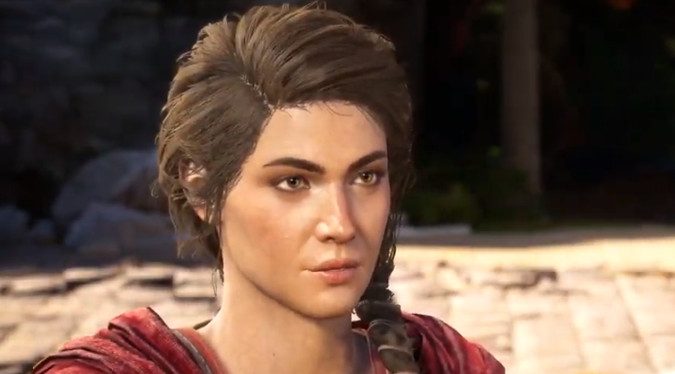
Sometimes a game franchise forgets what it is, or even deliberately decides to become something else. This risks alienating their established fan bases and is a radical, and at times unwelcome, deviation from their established successful formula.
So when a game gets this deliberate reinvention right, attention must be paid. Over the past two installments, the Assassin’s Creed franchise has very deliberately moved from an action stealth game with distinct roguelike elements, something like the Hitman series with historical window dressing into something else entirely. It’s now a robust and rather scintillant full fledged RPG that rivals the best work that BioWare or CD Projekt Red have to offer.
Until Obsidian Entertainment’s The Outer Worlds drops, in fact, it seems as if none of the usual suspects in RPG development are even trying to take back the crown, and no matter what does come out in the upcoming year, I don’t think it will matter. In a very real way, with Origins and especially with Odyssey, Ubisoft has managed the nearly impossible: they’ve deliberately transitioned from their original form while bringing what made that form intriguing along for the ride.
Plus they got me to play an Assassin’s Creed game, a feat none of the others (not even the ones with Ezio) managed.
So how did they do it?
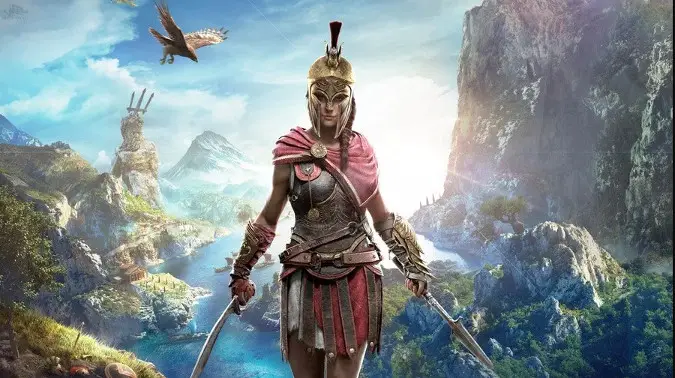
Odyssey was the RPG no one else was making
Part of the reason that this transformation seems to have worked, and worked beautifully, is that the biggest names in the RPG field have either been busy on something that won’t be out for a while or just straight up not making RPG’s. CD Projekt Red’s Cyberpunk 2077 doesn’t have a release date yet. Bethesda put a great deal of effort into a Fallout game that wasn’t an RPG —and wasn’t particularly well received. And BioWare — the company that essentially invented the RPG formula that Ubisoft is using — decided to focus on Anthem, a multiplayer game that delivers most of its story through dialogue back at a quest hub and deliberately veers away from the kind of questing that lets you decide to, say, seduce one or both members of a couple attempting to overthrow the tyrant of a small nation.
While everyone else was chasing other games, Ubisoft, without much fanfare, announced a new Assassin’s Creed game that would be set in Greece during the Peloponnesian War, and oh yeah, it would be a full fledged RPG with branching dialogue (a first for the series) where you could make specific story choices and the effects of these choices would play out throughout the game. People were amazed and even disbelieving — I know I was.
When the game came out and I got my hands on it, I was to a certain degree afraid to trust it. Could it possibly be a good RPG?
In some ways, it isn’t. For starters, it’s enormous. Sometimes the size of a game is actually a hindrance to RPG storytelling, because instead of a focused narrative, you get a diffused world and you just wander around the sandbox experiencing things. Sandbox games are fun, but they’re not usually tightly focused stories.
Odyssey combats this by actually having several main stories at once which it lets you complete in different orders, depending on your own interest. There won’t be spoilers in this review, so I won’t say what those choices are, but I’ve replayed the game enough times to know you can truly complete them entirely out of order and they definitely have some interesting twists and turns. But the scale can be daunting.
There is a lot to do in this game. The mercenary system, that lets you hunt (or be hunted by) bounty hunters, irritated me at first. But once I understood how to game the system, I started letting myself be deliberately hunted by committing just enough mayhem — killing soldiers in front of people, that sort of thing — to ensure I had a steady stream of bounty hunters showing up for me to kill them and loot their corpses. A few times this bit me, like when a level 47 merc showed up when I was level 22, but overall I had a great time. And the naval combat is a ton of fun. You could theoretically just sail your ship around the Aegean hunting down pirates — there’s enough there that it could be a game all on its own.
But even with its flaws, Odyssey works as an RPG.
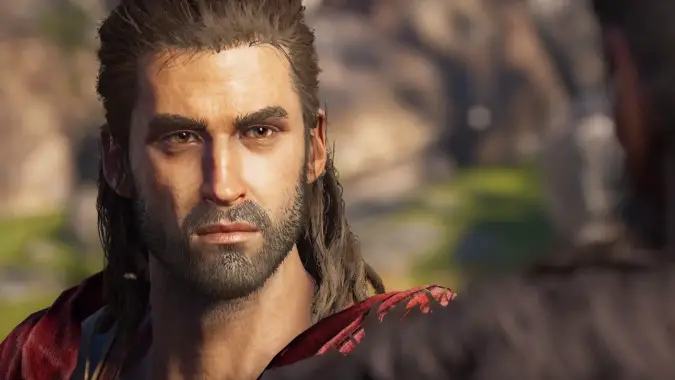
Odyssey isn’t everyone’s perfect game
People who have issues with ACO fall into a few camps.
Some have issues with it that are rooted in it being too inclusive or unrealistic because you can play as a woman, and I have no patience for them. Not only were Spartan women notorious throughout Greece for being raised in as rigorous a manner as the men and being easily as dangerous — look up Gorgo — but there were several women in Greek history, like Artemisia I of Caria, who fought in war and even led troops into battle. If your problem with this game is that there are women or brown people in it, we profoundly disagree on games.
But they aren’t the only ones who have problems with the game. Some complaints come from purists — fans of the franchise from its beginning — who feel betrayed by the shift in gameplay. And to a degree, they have a point. Odyssey leaves a lot of the trappings of games like Assassin’s Creed 2 or Assassin’s Creed Syndicate by the wayside. You’re not playing an Assassin, at least not one with a capital A. You’re not part of any Creed. You have no organization to back you up (or betray you).
This game is more about a lone hero, making choices instead of just going through the exact same story and trying to play as well as possible. The series’ combat system is wholly transformed and is much more familiar to those of us used to RPG elements, like getting better gear and spending talent points on abilities as you level up. Hell, the game actually lets you decide what your Alexios or Kassandra will say or do, which is absolutely not something you got to do in previous AC games.
If you were a big Assassin’s Creed fan back in the day, I can see why you’d be upset.
But I wasn’t.
For me, Odyssey does an amazing job of taking pretty much everything I like about RPG’s. It has a big sandboxy world to explore, there are several dedicated game-long storylines that incorporate player choice sometimes in surprising ways, I can play dress-up with pretty gear (the game has a transmog system, guys), and I get to make decisions that can absolutely ruin my world, forcing me to replay the game just to see what would happen if I did something different. And while the voice acting can vary in quality, I don’t think anyone can in fairness say that the performances of Michael Antonakos as Alexios or Melissanthi Mahut as Kassandra, the two choices for protagonist, were anything less than spectacular.
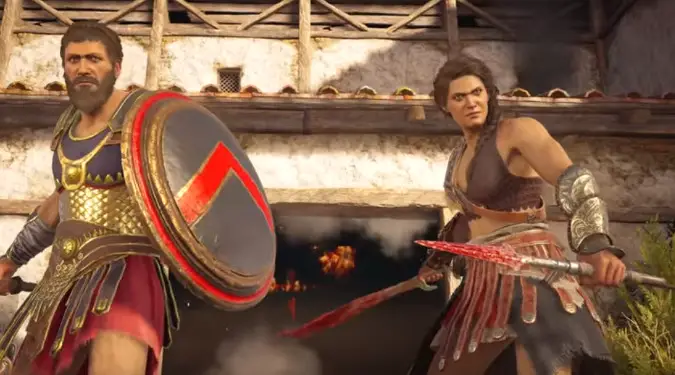
The voice acting steals the show
Mahut and Antonakos weren’t the only great actors on display, either. Elias Toufexis (Adam Jensent from the Deus Ex games and The Expanse) does two good turns as Spartan King and hero Leonidas as well as Nikolaos, the man who raised the main character (and employed the Mishima family approach to parenting for you Tekken fans out there). Maria Syrgiannas puts in fantastic work both as a young Kassandra if you choose to play as her and as Myrinne, the mother of whichever protagonist you pick. And Barnabas, played by Andreas Apergis, is an absolute delight. What they all infuse their performances with is a real sense of humanity, of being actual people in often utterly insane circumstances, dealing with events that are threatening to destroy the world as they know it.
While I make no secret of the fact that I prefer to play as Kassandra and absolutely love Mahut’s performance (very few actors could manage to make me laugh and make me cry this many times while playing a video game) that in no way detracts from Antonakos’ performance. Both he and Mahut play the main hero and an important villain/antihero in the story, depending on your choices. Both do an amazing job portraying either with a real sense of humanity, conveying a host of complicated emotions from rage and hate to silky contempt to love, loss, even wry humor and self-deprecating sarcasm. I’ve now played through the game a few times as both Alexios and Kassandra and both performances are surprisingly nuanced.
Now, I won’t front — the story takes some big liberties with established historical fact. While it gets some details very right, others it fudges, and fudges hard. I’m looking at you here, Pausanias. But while the history buff in me cringed at times, the broad strokes were accurate enough, with specific figures dying roughly when they should have. And I don’t care that Brasidas probably wasn’t hanging out with a misthios all the time, he’s my battle bro and I kind of regret my Kassandra couldn’t romance him.
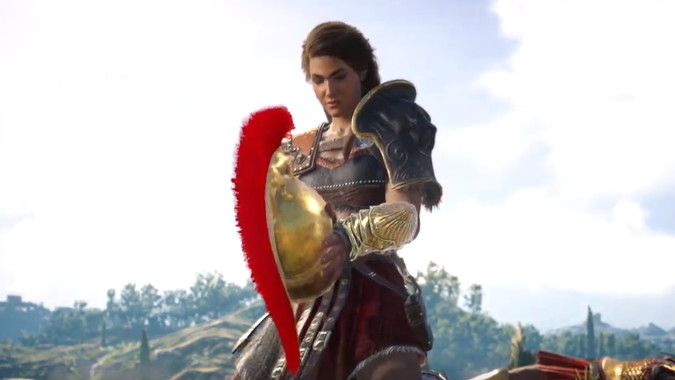
Odyssey isn’t a trailblazer
This is not a game that reinvents the RPG formula. In fact, if you’ve played any major RPG in the past decade — Mass Effect Andromeda, Skyrim, Dragon Age Inquisition, any of the Witcher games, Fallout 3 or 4 — you will see bits that got cribbed. And I’ve seen a lot of criticism (some deserved) of its microtransaction model which allows you to buy XP boosts and in-game money in exchange for real money. I disagree with the idea that you need to buy an XP boost to finish the game or that it is in any way designed to force players to do that — to my mind, all you need to do to level and finish the story is actually play the game, and keep in mind it’s an RPG that expects you to complete all the available quests in a zone before moving on.
If you go to Euboea, then expect to stay there for a while. Don’t just do the main storyline and move on, actually take all those side quests. When I was in Phokis, I quickly found myself tracking down stolen sapphires and procuring bear testicles for an older woman’s love potion. Don’t be afraid of these unrelated side quests: embrace them. They’re some of the best parts of the game.
This is a classic RPG of the model made famous by BioWare and perfected by Bethesda and CD Projekt Red. It very much hinges around you doing everything and going everywhere.
But it isn’t particularly original until you realize what a departure it is for the series. I’ve tried to like every single AC game. I failed, because the game type isn’t one I enjoy. But Odyssey manages to retain just enough of the classic tropes of the setting (sneaking around, one-shot killing people with a special bladed weapon only you have, wiping out entire keeps like a one-woman plague) while utterly changing everything else.
It’s almost a magic act.
Looking at the franchise as a whole, Odyssey is the second act of a massive transformation begun in Origins and it is, for me at least, the best new game I’ve played all year.
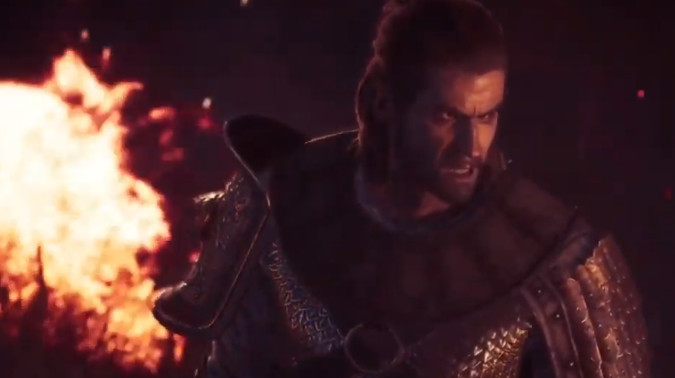
The pace of content releases is nearly perfect
One of the ways Odyssey has stayed one of the best games I’ve played into 2019 is by constant content. Between DLC I’ve purchased via the Season Pass, constant new ships to hunt down and new mercenaries to kill, and free story quests that update the world and provide little half hour chunks of questing the game has kept itself fresh for six months now. I just recently finished act three of the Legacy of the First Blade DLC, and while it has a few rough patches I honestly felt like the third chapter was some of the best storytelling I’ve seen in an RPG in a while. It’s rare that a game focuses this much on family and loss and is unafraid to really show the main protagonist endure that loss.
I think the constant drip of content Ubisoft has managed with this game is one of the rare triumphs of the modern model of game distribution. Most game companies seem to view the “games as a service” model as a license to drop a game unfinished because you can fix it later. With Odyssey, we got a huge, expansive game with all sorts of content and hours upon hours of gameplay at launch, and it’s only dropped more and more as time has passed.
I feel like I’ve talked enough, and yet, I could keep on talking. Where this game shines — where it is at its best — is when it uses its setting and the mythology the Assassin’s Creed setting has built up to tell us about human hearts in conflict with themselves. Seeing people have to make choices that at times destroy them, witnessing horror, rage, pain, fear, and love all tangled up in what we do and how we do it, and occasionally killing a cyclops or dominating an entire battlefield. It goes from the ridiculous to the ridiculously sublime, and it isn’t afraid to laugh at how mad it can all feel, while still crying at what ends up lost.
In short, I love this game.
Please consider supporting our Patreon!
Join the Discussion
Blizzard Watch is a safe space for all readers. By leaving comments on this site you agree to follow our commenting and community guidelines.
 @MatthewWRossi
@MatthewWRossi



